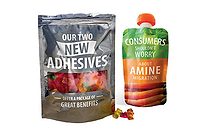Top 10 convenience store food safety challenges: How to mitigate risks

Convenience stores are evolving to offer a wider array of fresh food options and prepared meals than ever before. Many store employees may be taking on new tasks such as food preparation, storage, and handling, all of which leave c-stores at a greater risk for food safety infractions.
Steritech analyzed data from over 2,000 food safety assessments it conducted in c-stores between January and June 2018 to determine the 10 most commonly observed food safety issues/concerns. They were:
- Food contact surfaces: cleanliness
- Cold holding
- Sanitizing (non-dish machine)
- Expired food
- Potential contamination
- Hot holding
- Pest infestations
- Food handling for time/temperature
- Hand washing
- Food packaging / condition
Connecting the top 10 to training needs
In a recent industry survey* on c-store staffing, more than half of respondents reported having turnover of 90 percent or more. That can make finding time for food safety training a challenge. This top 10 list can serve as a guide for operators to address frequently cited issues.
The specifics
Food contact surfaces: cleanliness
Food contact surfaces include things such as soda nozzles, ice dispensers, knives, cutting boards, and slicer parts. Almost half of all assessments (48 percent) included observations in this area.
Soda and fountain drink nozzles, coffee dispensers, smoothie, shake, and slush machines are high-use items that can quickly develop organic debris buildup. In addition to food safety issues, this buildup can attract pests.
Many of these machines need to be disassembled for proper cleaning, which can take time.
Establish a cleaning frequency, stick to it, and make sure everyone knows how to properly clean machines.
Cold holding
Cold holding issues were cited around grab-and-go items such as salads, sandwiches, and yogurts, dairy products, pre-made sandwiches, tuna and pasta salads, sushi, hummus, and fresh deli meats on make-your-own stations, and sliced or cut tomatoes.
Pay special attention to training on chilling and holding cut or sliced tomatoes, which are a time/temperature control for safety (TCS) food.
Employees should know the proper protocol to follow when a product is out of temperature.
Sanitizing (non-dish machine)
In many c-stores, a dish machine isn't in use, so sanitizing occurs in a triple sink or by using sanitizer prepared in spray bottles or buckets. The most frequent reason for this being cited is that sanitizer is not at the proper concentration. Employees should refer to their sanitizer kit's instructions for the correct concentrations and use test strips to verify.
Expired food
Nearly 20 percent of analyzed assessments included an issue with expired food. This can include both fresh foods prepared with a use-by date, as well as canned items or products that may sit on the shelf for longer periods of time.
Checking shelves can fall to the bottom of the "to do" list in a busy store. Make this a priority. Follow the First In, First Out method of rotation (FIFO) and conduct frequent checks to remove any expired food from the sales floor.
Potential contamination
This line item includes any chemical, physical, or biological contamination risk posed to food.
To eliminate chemical contamination risk, store cleaning and other chemicals in a safe and secure spot, away from food where they cannot be confused with other products. Ensure that chemicals and cleaning products are accurately labeled to avoid misuse.
Biological contamination risks include things such as cross-contamination, i.e., ensuring that raw meat and poultry are stored below ready-to-eat items to prevent potential contamination.
Physical contamination can include things such as thumbtacks on boards hanging above food prep stations, bread bag wires, pieces of plastic or metal from broken equipment, etc.
Do periodic inspections to look for these conditions. Use signs and regular staff meetings to remind team members of the proper practices and how to report problems.
Hot holding
Like its sister item cold holding, hot holding can be an issue for things such as prepared chicken, soups, etc. that must be above 140 degrees F.
Educate staff members on properly stocking items to avoid putting too much out at one time. Employees should also know what to do if a hot item is found to be below 140 degrees F.
Pest infestations
Pests can carry pathogens that have the potential to contaminate foods and surfaces. Common pest issues at c-stores include house flies, fruit flies, cockroaches, ants, and rodents. To prevent pest activity:
- Properly store and put away food.
- Keep soda fountains clean. Periodically flush the lines to avoid buildup of organic debris.
- Regularly clean floor drains.
- Do periodic inspections to look for holes, gaps, and cracks that could allow pests to gain entry.
- Work with a pest management provider to have an integrated pest management plan in place.
- Ensure that dumpster areas are clean. Clean dumpsters and dumpster pads regularly. Dumpsters should have lids that close.
- All garbage being put into a dumpster should be in sealed bags.
- All trash cans should have liners to reduce the buildup of pest-attracting organic debris.
- Consider fitting trash cans customers use with self-closing lids to prevent pests from being attracted to odors.
Food handling for time/temperature
Using time as a public health control for cold held or hot held foods is acceptable, but must be followed closely and products must be discarded when their time window closes.
The solution for this is to closely monitor hot and cold-held foods. Use pre-formatted temperature logs and task specific personnel with recording temperatures to help reduce problems in this area.
Hand washing
C-store employees often move between food handling and other tasks – and hand washing can be overlooked in these fast-paced environments. Employees should wash their hands:
- After taking out the trash
- After using the restroom
- After taking a break/smoking
- After touching face or blowing nose
- After handling money
Confusion over glove use is also common. Gloves should be changed whenever an employee would wash their hands or anytime they move between tasks.
Managers must model proper hand washing and monitor employee behavior. Applauding proper behaviors can encourage other employees to follow suit.
Finally, be sure hand washing sinks are easily accessible and stocked with hot water, soap, and paper towels or a hand dryer.
Food packaging / condition
Keeping items in saleable condition is tougher that it seems. Cans/items that are dented and swollen, as well as produce that is molding, should be on the radar of workers at all times.
Doing daily inspections of food items will ensure that all foods remain in safe, saleable condition. While customers will definitively avoid molding items or items that look unsafe, they also may be less likely to buy items that look like they have been on the shelf for a long time, beaten up, or damaged. This can influence sales, as well as overall customer perception of cleanliness.
Implementing a food safety plan that works for today's modern convenience store
As c-stores continue to elevate food offerings to compete for consumer dollars, food safety shouldn't be pencil-whipped. It should be seen as playing an integral role in a store's employee training plans and customer experience initiatives.
For more food safety information or details on Steritech's assessment services, visit the Steritech website.
ABOUT STERITECH
Steritech is a provider of specialized brand protection services for the restaurant, food retail, foodservice, and hospitality industries. As a trusted partner to many of the world’s leading brands, Steritech conducts over 250,0000 assessments a year in the areas of food safety, service excellence, workplace safety, and guest experience to help businesses mitigate risk and drive improvement. In addition to assessment programs, Steritech offers support to quality and safety initiatives with supplementary programs, including self-assessment technology, OneLook health inspection information management, and a wide-range of consulting and special business projects. Founded in 1986, Steritech is headquartered in Charlotte, North Carolina. For more information on Steritech, please visit www.steritech.com or call 800.868.0089.
Steritech is part of Rentokil Initial plc, a business services company, operating globally in over 70 countries. For more information, visit www.rentokil-initial.com.
SOURCES
*Convenience Store Decisions, 2019 Human Resources Study, https://cstoredecisions.com/wp-content/uploads/2019/04/2019-Human-Resources-Study.pdf
Looking for a reprint of this article?
From high-res PDFs to custom plaques, order your copy today!





